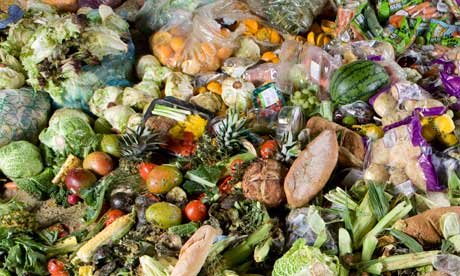 |
| Reviews and Templates for Expression We |
Changing the mindset of food waste
Almost half of the world's food is thrown away

Food is Energy: up to 2bn tonnes of it, produced worlwide, never gets to a plate
As much as half of all the food produced in the world ends up as waste every year, engineers warned in the recent report from the UK's Institution of Mechanical Engineers (IMechE). The report blames the "staggering" new figures in its analysis on unnecessarily strict sell-by dates, buy-one-get-one free and Western consumer demand for cosmetically perfect food, along with "poor engineering and agricultural practices", inadequate infrastructure and poor storage facilities.
In the face of United Nations predictions that there could be about an extra 3 billion people to feed by the end of the century and growing pressure on the resources needed to produce food, including land, water and energy, the IMechE is calling for urgent action to tackle this waste.
Their report, Global Food; Waste Not, Want Not, found that between 30% and 50% or 1.2-2bn tonnes of food produced around the world never makes it on to a plate.
In the UK as much as 30% of vegetable crops are not harvested due to their failure to meet retailers' exacting standards on physical appearance, it says, while up to half of the food that is bought in Europe and the US is thrown away by consumers.
And about 550bn cubic metres of water is wasted globally in growing crops that never reach the consumer. Carnivorous diets add extra pressure as it takes 20-50 times the amount of water to produce 1 kilogramme of meat than 1kg of vegetables; the demand for water in food production could reach 10–13 trillion cubic metres a year by 2050.
This is 2.5 to 3.5 times greater than the total human use of fresh water today and could lead to more dangerous water shortages around the world, the IMechE says, claiming that there is the potential to provide 60-100% more food by eliminating losses and waste while at the same time freeing up land, energy and water resources.
Tim Fox, head of energy and environment at the IMechE, said: "The amount of food wasted and lost around the world is staggering. This is food that could be used to feed the world's growing population – as well as those in hunger today. It is also an unnecessary waste of the land, water and energy resources that were used in the production, processing and distribution of this food."
In order to prevent further waste, governments, development agencies and organisation like the UN "must work together to help change people's mindsets on waste and discourage wasteful practices by farmers, food producers, supermarkets and consumers," the IMechE said.
From the report
"By 2075, the United Nations’ mid-range projection for global population growth predicts that human numbers will peak at about 9.5 billion people. This means that there could be an extra three billion mouths to feed by the end of the century, a period in which substantial changes are anticipated in the wealth, calorific intake and dietary preferences of people in developing countries across the world.
Such a projection presents mankind with wide-ranging social, economic, environmental and political issues that need to be addressed today to ensure a sustainable future for all. One key issue is how to produce more food in a world of finite resources.
Today, we produce about four billion metric tonnes of food per annum. Yet due to poor practices in harvesting, storage and transportation, as well as market and consumer wastage, it is estimated that 30–50% (or 1.2–2 billion tonnes) of all food produced never reaches a human stomach. Furthermore, this figure does not reflect the fact that large amounts of land, energy, fertilisers and water have also been lost in the production of foodstuffs which simply end up as waste. This level of wastage is a tragedy that cannot continue if we are to succeed in the challenge of sustainably meeting our future food demands."
|
|
|
|
Copyright 2011 Energy and Technical Services Ltd. All Rights Reserved. Energyts.com |